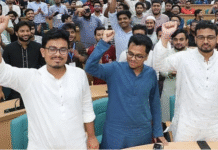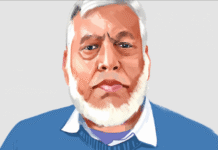
Prof Serajul Islam Choudhury, a leading public intellectual and academic of the country, talks to Emran Mahfuz of The Daily Star about the government’s handling of the impacts of Covid-19, inequalities and injustices in society, future threats and the need for reforms. The following is a translated excerpt.
Covid-19 has changed our lives and lifestyles in a manner never seen before. There is no certainty about when we will be free from its shackles. How did we come to this point?
This pandemic is unprecedented indeed, but its consequences are partly the result of our ignorance. We have taken nature for granted, and are consequently suffering from climate change, cyclones, rising tides, floods, droughts, etc. The coronavirus is one such outcome. In the last hundred years, humanity has witnessed tremendous progress in terms of science and technology, yet it could not prevent a disaster like Covid-19. We have invested in manufacturing weapons of mass destruction and indulged in material progress. If we had spent even a portion of our energy to the prevention of diseases and treatment, then perhaps this pandemic could have been avoided, or it couldn’t have hurt us the way it did.
Many countries have dealt with Covid-19 quite efficiently. Unfortunately, Bangladesh fares poorly in this regard. Many say it’s due to the lack of proper coordination and prevention measures. How do you see it?
Certainly, there has been a lack of coordination as well as a lack of sense of responsibility. The state is duty-bound to look after the citizens and ensure their safety. The most basic needs for their survival are food and shelter. Since the authorities are least concerned about our health, treatment has now become more of a commodity available only for those who can afford it. Our healthcare system is in tatters. Such a development was made possible by the state’s lack of accountability since no one can dare question those in power. The National Assembly is not effective, there is no functional opposition party, and there is no freedom of the press. In addition, there is the Digital Security Act which is further choking the voice of the public. If those in power could have been held accountable for their action or lack thereof, then there would be proper coordination in our response and the situation could be turned in favour of the general public.
Healthcare is a basic right but the pandemic has revealed the sorry state of our healthcare system as inequality runs rampant here. How can one align this with the lofty socialist ideals that led to our liberation?
Yes, the Liberation War was fought to establish equal rights and opportunities for all people. Even before the war, there had been certain improvements but those were selective and marred with prejudice—there was vast regional disparity and class inequality. We fought the war not just for the sake of sovereignty, but also to eliminate these inequalities. Unfortunately, discrimination remains firmly in place even today and the pandemic has only exacerbated the situation. The poor seem to be getting poorer as the rich continue to deprive them.
The way forward is to break the system of individual ownership and establish social ownership. This calls for a social revolution as token reforms will no longer work. We need a fundamental change in social relations. It is the people who are deprived that can revolutionise the system along with the support from conscious individuals of the society.
Who should be held accountable for the scandalous developments with regard to issuing of fake Covid-19 certificates in Bangladesh, which suffered an image crisis as a result? Whose responsibility is it to mend the image of our nation now?
The damage done was severe and extensive. It has been proven, once again, that fraudulence is widespread across our country even when the question is of life and death. Such fake certificates could be a fatal blow to the general public. What’s dreadful is that it happened not just with the knowledge of an influential section at the Directorate General of Health Services, but with their active support.
In order to restore our image and reputation, we have to continue with our “Liberation War” in order to establish a fully democratic state and society. Another name for this democracy is socialism, which we have failed to achieve. The further we drift away from it, the more hardship and miseries we are to suffer. It is our responsibility to march forward with dignity, and that requires a political movement through an organisational approach. We need to clearly set our goals and the leadership will emerge from within the movement.
Many people and families have left the cities, jobless and without aid, in the wake of the outbreak. Isn’t it the state’s responsibility to ensure they are taken care of? The intellectuals of our society remain silent while the Fourth Industrial Revolution is almost here. What should be done under such circumstances?
The Fourth Industrial Revolution does not worry me; I’m more concerned about the effects of capitalism. The coronavirus will definitely come under control one day, vaccines will be made available, and the treatment situation will improve as well. But is there any guarantee that a greater threat will not come in the future? It is our responsibility to make sure that a well-organised revolutionary change in existing systems and structures takes place to avoid the looming disorder, and this applies to every nation. Only then can a sense of internationalism be created based on cooperation and sympathy. It will be a world free from war and sustained through social production and distribution and this will restore happiness and comfort in the lives of human beings.
There have a number of high-profile crimes and corruption cases even in the midst of the pandemic, but the authorities remain nonchalant about them. What seems to be the reason behind that?
The reason behind it is that the authorities are least concerned about the interest of the general public as well as public opinion. The injustices that are happening are a matter of grave concern for the people, but not for the state. Many criminals go unpunished, and as a result, the crime rate goes up. Proper investigation will perhaps reveal that government officials and powerful people are often involved with many of the offences being committed. The ruling class does not take the consent of the masses into consideration and often takes power by force. When it comes to voting, deserving candidates often remain unelected, as those with the most amount of money win the votes.
When the intellectuals in our society speak, it is seen that one group among them supports the government—either because they have already benefitted from government action or will soon—while another criticises it. The latter also remains optimistic that there is a chance to receive benefits in the future. However, their arguments are not strong. Even most of the media do not give them coverage in order to avoid any altercation with the authorities. Also, the government does not encourage dissent, and is therefore happy to silence the voice of the opposition. Unfortunately, neither the government nor the opposition want to explore the deeper issues of public life which are intimately linked with the state and the social system. They refuse to accept that the persisting problems are the manifestation of the existing capitalist economy and ideology, and they do so for their own benefits.
From the social perspective, how would you describe the overall state of our society?
The present condition does not seem favourable at all. Whatever improvement we see is the external view. Inside there is a whole different picture—one of increasing inequalities and injustices. It has somewhat become a norm that with progress, inequality tends to rise. Such wide-ranging inequality had never been there in our society before. This is worsening the state of poverty and making people deeply frustrated. The rich have set examples with their lack of patriotism and consumerism, which is worryingly spreading among the deprived people too.
The interview has been translated from Bangla by Minam Haq of The Daily Star.









